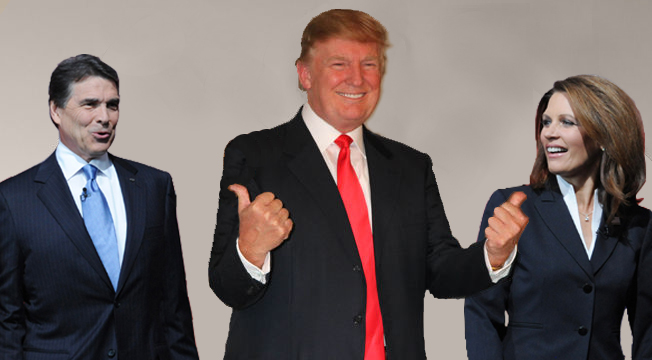Actually hurting one’s political brand is different than simply saying something silly. There has been plenty of that in 2012, too. But hurting the brand, for our purposes here, is regressing on a political tenet that’s already been decided on — refusing to acknowledge that the wider public is on one side of an issue. In other words, it’s not simply that there’s been an issue with the product. It’s that the product was sometimes so off that it may cause the consumer to think about ditching the brand altogether.
Here are five examples where primary participants produced a flub totally opposite to the general public’s stance on the issue at hand – risking the party’s wider appeal in the process.
Rick Perry Would Send Troops Back To Iraq
Yes, Texas Gov. Rick Perry’s campaign appears to be on its last legs. And yes, the Iraq War was very much popular in the early part of the last decade. But things have changed since then — and by changed, we mean ending the military involvement there is one of the few things that Republicans, Democrats, and independent voters all agree on, according to Gallup data. It’s not a suggestion that’s been made much since the withdrawal in December.
Then Perry did in Saturday night’s New Hampshire debate.
I Was A Paid Historian, Not A Lobbyist
Former House Speaker Newt Gingrich’s ego is at play here, but so is the message to independent voters frustrated with D.C. — influence trading is a real thing, and can be somewhat unseemly to voters if you get rich off of it. Gingrich’s defense, that he was a hired academic rather than someone tasked with building bridges with Congress, essentially banked on voters being particularly informed.
Of course, there was a very likely reason Newt didn’t want to admit to being a lobbyist — a CNN poll from last summer showed that 86 percent of Americans essentially think that pols are bought with campaign contributions, a theme synonymous with the profession.
The Trump Debate That Almost Happened
Seriously though, there was a going to be a presidential debate (the Presidency of the United States of America, that is) in which Donald Trump was going to moderate, two candidates accepted, and it almost took place. This was on top of the string of Republican candidates that actually trekked to New York to meet with The Donald, which the media covered and seemed to add actual legitimacy to his endorsement.
But as a Fox News poll showed, Trump’s endorsement does not help. In fact, it makes a voter four times less likely to support a candidate. Those vying for the presidential nomination may want to take note of that next time.
Bachmann Recounts A Theory On Vaccines Causing Mental Retardation
It’s one thing to be against global warming, but it’s another to fully embrace an antithetical position to science. The vaccine issue is as thorny as they come, as most issues surrounding children and parents usually are. Parents love their children, and if they think their child is afflicted with mental retardation because of a vaccine, dragging their beliefs through the ringer doesn’t do much good. But when Rep. Michele Bachmann (R-MN) recounted the theory from a voter she allegedly met on the campaign trail, and then used it as evidence to back up a political attack against Perry in a debate, she made the view of the issue less sympathetic, more ideologically charged and rather off-putting.
When the American Academy of Pediatrics has to stop saving the lives of children for a moment to refute a presidential candidate’s claim, you may have caused yourself some unnecessary PR problems.
Corporations Are People, My Friend
Say you were running the Obama 2012 re-election campaign. You’re hoping for some sound bite, something that completely wraps your key message about middle class economics, shows President Obama is more in touch with the lives of average Americans, something that encapsul……
Oh.
The famous gaffe by former Massachusetts Gov. Mitt Romney, the former head of financial firm Bain Capital, doesn’t just reinforce a stereotype of Romney as an eastern blue blood. He trumpets his business experience as a positive, which certainly helps with many voters concerned about the economy. But President Obama has never been below the majority fifty percent mark on the question of whether voters think he “cares about people like you” in the AP/GfK national numbers, and with an electorate that overwhelmingly defines itself as middle class, look for the “corporations are people” line to show up in some TV ads, and soon.






